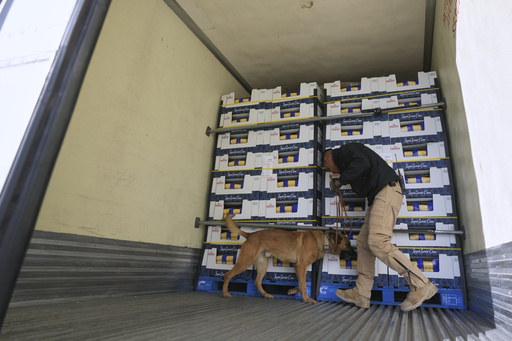President Donald Trump has announced a temporary 30-day delay on potential tariffs against Mexico and Canada as both nations have taken initial measures to address his concerns regarding border security and drug trafficking. The decision comes after a series of escalating tensions that nearly triggered a trade war between the United States and its two largest trading partners, threatening economic stability and leading to increased prices on various goods.
Trump expressed satisfaction with the pause, stating on social media, “I am very pleased with this initial outcome, and the Tariffs announced on Saturday will be paused for a 30-day period to see whether or not a final Economic deal with Canada can be structured. FAIRNESS FOR ALL!” In a similar vein, Canadian Prime Minister Justin Trudeau confirmed on X that the truce would enable both countries to collaborate, as he revealed plans for naming a fentanyl czar, designating Mexican cartels as terrorist entities, and creating a Joint Strike Force aimed at addressing organized crime and drug-related issues.
This temporary halt follows discussions with Mexico concerning drug smuggling and illegal immigration. While President Trump announced the forthcoming 10% tariff on China that is still scheduled to go into effect soon, he has plans to engage in talks with Chinese President Xi Jinping in the coming days.
Though the immediate threat of a trade war has receded, the lingering tensions over tariffs remain unresolved. Canada and Mexico have gained some breathing room, but Trump made it clear that he could reinstate tariffs at any time and is also considering imposing new taxes on goods imported from the European Union, creating an atmosphere of uncertainty over potential future conflicts impacting the global economy.
Earlier, Trump had directed a significant 25% tariff on imports from both Mexico and Canada, alongside a 10% tariff specifically on Canadian oil, natural gas, and electricity. These announcements caught many investors and business leaders off guard, despite Trump’s prior hints about these possible measures.
Economic analyses from various institutions indicated that the tariffs might have detrimental effects on growth, income levels, and prices, yet the president maintained that they serve as necessary tools to combat illegal immigration and curb the flow of dangerous substances into the U.S.
In discussions with Mexican President Claudia Sheinbaum, Trump characterized their exchange as “very friendly” and emphasized his eagerness to move forward with negotiations, which are to be led by key figures in his administration. Sheinbaum cited her commitment to bolstering border security with an additional 10,000 National Guard members and affirmed cooperation with the U.S. in tackling the trafficking of firearms into Mexico.
Unlike Mexico’s established efforts to avert tariffs in 2019 by deploying troops to its northern border, Canadian officials have expressed doubts about their ability to sidestep similar punitive measures. A senior Canadian source relayed concerns that shifting demands from the Trump administration could put the country in jeopardy of suffering a tariff imposition.
When asked what Canada could do to avoid tariffs, Trump responded with uncertainty, humorously suggesting potential statehood for Canada, signaling underlying tensions despite a historically friendly relationship.
The financial landscape reacted to the approaching tariffs, prompting businesses to prepare for potential price increases. Stew Leonard Jr., a supermarket chain CEO, mentioned efforts to adjust product sources in anticipation of the tariffs. Although stocks dipped slightly, there remains a glimmer of hope that these tariffs may be temporary, reflecting a sense of trepidation among market participants about the economic implications of prolonged trade tension.
Trump has conveyed a steadfast belief in the power of tariffs as a negotiation tool, claiming that they provide leverage due to the size of the U.S. economy. He reiterated the effectiveness of tariffs, framing them as a means to stimulate economic success, while also hinting that further punitive measures against China are on the horizon if negotiations do not yield favorable results.
The potential impact of tariffs extends beyond commerce; it affects various communities reliant on tourism, like Skagway, Alaska, where local officials acknowledge that visitors from Canada are vital to the economy. Concerns are prevalent regarding how tariffs and exchange rate fluctuations may inhibit travel and affect local businesses.
As the situation remains fluid, many stakeholders are left in a state of anxiety, uncertain about how the evolving trade relations will shape their economic prospects in the near future. The coming days will likely provide a clearer picture of the potential outcomes as the discussions unfold and decisions are made.



